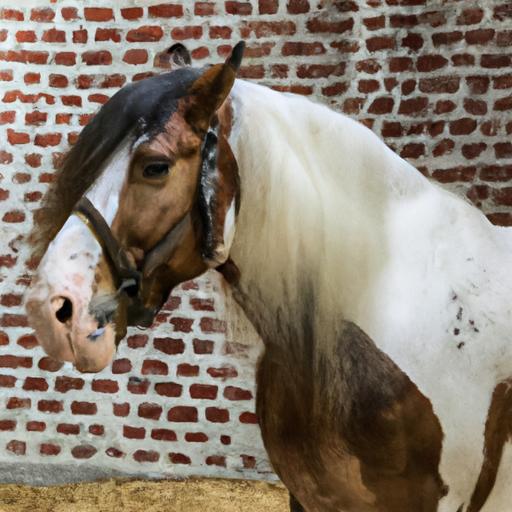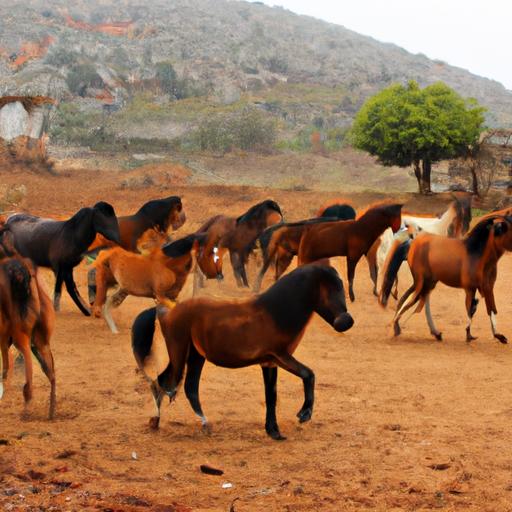Discover the unique characteristics of greek horse breeds – their adaptability, strength, and distinctive features. Unveiling the beauty of greek horse breeds.
Introduction

When we think of Greece, images of ancient ruins, captivating mythology, and rich cultural heritage often come to mind. But did you know that Greece is also home to a remarkable variety of horse breeds? These majestic creatures have played a significant role in shaping the nation’s history and culture. Today, I invite you on a captivating journey to explore the world of Greek horse breeds and unravel their fascinating stories.
Greek horse breeds hold a special place in the hearts of the Greek people, serving as a symbol of strength, resilience, and nobility. For centuries, these magnificent equines have been companions, allies, and even warriors in the annals of Greek civilization. Through this article, we will dive into their origins, their remarkable characteristics, and the legacy they leave behind.
The purpose of this article is to shed light on the remarkable diversity of Greek horse breeds, their historical significance, and their relevance in modern times. Whether you are an equestrian enthusiast, a history buff, or simply curious about the world of horses, this article will provide you with a deeper understanding of the Greek horse breeds and the cultural tapestry they are intricately woven into.
So, fasten your seatbelts and get ready to embark on a captivating journey through time as we uncover the allure and importance of Greek horse breeds. Let’s dive into the rich world of these magnificent creatures and discover the stories behind their hooves.
History of Greek Horse Breeds
Ancient Origins of Greek Horse Breeds
The history of Greek horse breeds stretches back to antiquity, where they were revered for their strength, agility, and loyalty. These horses can trace their lineage to the ancient civilizations that flourished in the Greek peninsula. From the majestic Thessalian plains to the rugged mountains of Arcadia, Greek horse breeds were bred and nurtured in diverse landscapes, resulting in their unique characteristics.
Influence of Greek Horse Breeds in Ancient Warfare
Greek horse breeds played a pivotal role in ancient warfare, providing a crucial advantage on the battlefield. The Greeks recognized the strategic significance of cavalry and bred their horses accordingly. These equines were meticulously trained, enabling them to charge with astonishing speed and deliver devastating blows to the enemy ranks. From the legendary cavalry of Alexander the Great to the valiant horsemen of the Spartan army, Greek horse breeds were instrumental in shaping the outcome of historic battles.
Evolution and Development of Greek Horse Breeds Over Time
Over the centuries, Greek horse breeds have evolved and adapted to changing environments and societal needs. The influence of neighboring civilizations, such as the Romans and Byzantines, has left its mark on the development of these breeds. The introduction of foreign bloodlines, crossbreeding, and selective breeding practices have contributed to the diverse array of Greek horse breeds we see today.
Despite facing challenges such as political turmoil, warfare, and changing agricultural practices, Greek horse breeds have managed to survive and thrive. Their resilience and ability to adapt have ensured their continuity throughout the ages. Today, these horses stand as a testament to the enduring spirit of Greece and its deep-rooted equestrian heritage.
Join me in the next section as we delve into the enchanting world of popular Greek horse breeds, where we’ll uncover their unique traits and remarkable achievements.
Popular Greek Horse Breeds
Greek horse breeds encompass a diverse range of equine treasures, each with its own unique characteristics and contributions to Greek culture. Let’s explore some of the most prominent Greek horse breeds that have left an indelible mark throughout history.
Thoroughbred Greek Horse Breed
Characteristics and Physical Attributes
The Thoroughbred Greek horse breed is known for its elegance, grace, and athletic prowess. These horses possess a sleek and muscular build, making them well-suited for various equestrian disciplines. With their long, powerful legs and deep chest, they showcase incredible speed and agility. Their coat colors vary, including bay, chestnut, and gray, adding to their visual appeal.
Historical Significance and Notable Achievements
Throughout history, the Thoroughbred Greek horse breed has played a pivotal role in competitive racing and as formidable war companions. These horses have participated in prestigious equestrian events, showcasing their exceptional speed and endurance on the racetrack. Furthermore, they have been revered for their military contributions, carrying warriors into battle with unwavering loyalty and bravery.
Skyros Greek Horse Breed
Unique Features and Traits
Nestled on the island of Skyros, the Skyros Greek horse breed captivates with its distinct characteristics. These horses are known for their small stature, standing around 11 to 12 hands tall. Despite their size, they possess remarkable strength and resilience. Their exquisite appearance is characterized by a well-proportioned body, a refined head, and expressive eyes. The Skyros horses boast a variety of coat colors, including shades of gray, bay, and dun.
Traditional Uses and Adaptations to the Environment
The Skyros Greek horse breed has been an integral part of the island’s culture and economy for centuries. These horses have been utilized for various purposes, from agricultural work to transportation. Their small size and surefootedness make them ideal for navigating the rugged terrain of Skyros. Moreover, their adaptability to the island’s harsh climate and limited resources has made them a prized asset for the local community.
Karacabey Greek Horse Breed
Historical Background and Geographic Distribution
Originating from the region of Karacabey in western Turkey, the Karacabey Greek horse breed has found its way into Greece. These horses have a rich historical background, tracing their roots back to the times of the Ottoman Empire. Today, they can be found in both Greece and Turkey, particularly in the Thessaly region of Greece.
Key Characteristics and Purposes
Karacabey Greek horses are known for their robust build, strong legs, and noble presence. They exhibit versatility, excelling in various equestrian disciplines, including dressage, showjumping, and endurance riding. These horses have become popular for their ability to thrive in both leisure and competitive settings, showcasing their adaptability and athleticism.
Through their unique characteristics and historical significance, Thoroughbred, Skyros, and Karacabey Greek horse breeds stand as testaments to the enduring bond between horses and Greek culture. Their stories continue to inspire and captivate, reminding us of the profound connection forged between humans and these magnificent creatures.
Greek Horse Breeds in Modern Times
As we navigate the complexities of the modern world, Greek horse breeds face numerous challenges and threats that endanger their existence. It is essential to recognize these hurdles and take proactive measures to ensure their preservation for future generations to admire and cherish.
A. Challenges and Threats Faced by Greek Horse Breeds
Greek horse breeds, like many others, are confronted with various obstacles that pose a threat to their survival. Rapid urbanization, loss of grazing lands, and changing agricultural practices have significantly impacted the availability of suitable habitats for these magnificent creatures. Additionally, the rise of mechanization has led to a decline in the demand for horses in farming and transportation, further exacerbating the challenges faced by Greek horse breeds.
B. Conservation Efforts and Initiatives to Preserve Greek Horse Breeds
Despite the challenges, there is a ray of hope shining upon the preservation of Greek horse breeds. Dedicated organizations, passionate individuals, and governmental initiatives have come together to safeguard these breeds from extinction. Conservation efforts involve establishing protected areas, implementing breeding programs, and promoting sustainable practices that support the well-being and genetic diversity of Greek horse breeds. Through these initiatives, steps are being taken to ensure the survival of these remarkable equines and their cultural significance.
C. Modern-Day Uses and Roles of Greek Horse Breeds
While the traditional roles of Greek horse breeds may have evolved over time, they continue to play important roles in modern society. Today, these horse breeds are not only cherished for their historical significance but also valued for their versatility in various equestrian disciplines. From recreational riding to competitive sports such as show jumping and dressage, Greek horse breeds showcase their agility, strength, and grace. Moreover, they contribute to equine-assisted therapy programs, providing emotional support and healing to individuals facing physical, mental, or emotional challenges.
In conclusion, Greek horse breeds face challenges in the modern world, but efforts to preserve them are gaining momentum. By recognizing and addressing these challenges, we can ensure the survival and flourishing of these majestic creatures. Whether through conservation initiatives or their diverse roles in modern society, Greek horse breeds continue to captivate our hearts and remind us of the profound connection between humans and horses. Let us join hands in the endeavor to safeguard their legacy for generations to come.
Conclusion
As we reach the end of our journey through the world of Greek horse breeds, we are left in awe of the rich history, cultural significance, and unique qualities that these equines possess. The Greek horse breeds have stood the test of time, surviving and thriving in the diverse landscapes and challenging climates of Greece.
From their ancient origins to their modern-day roles, Greek horse breeds have embodied the spirit of the Greek people. Their adaptability to the Greek climate and terrain has allowed them to navigate the rugged mountains, lush valleys, and coastal plains with ease. Their strength, endurance, and agility have made them invaluable companions in various activities, whether it be agricultural work, equestrian sports, or even military campaigns.
One cannot help but be captivated by the distinctive physical features and coat colors that make each Greek horse breed truly unique. From the sleek and elegant Thoroughbred to the small yet mighty Skyros, these equines are a testament to the beauty and diversity of nature.
In conclusion, Greek horse breeds are not just horses; they are living links to the past, embodiments of Greek history, and cultural icons. Their significance goes beyond their physical attributes and abilities; they represent a deep-rooted connection between humans and animals, a bond that has shaped civilizations and enriched our lives.
To delve further into the enchanting world of Greek horse breeds and deepen your equestrian knowledge, visit Horsemasterypro.com. Our platform is dedicated to providing valuable insights, training resources, and a community of passionate equestrians who share a love for these magnificent creatures. Join us on this captivating journey as we continue to celebrate the wonders of Greek horse breeds and the profound impact they have had on our world.
So, saddle up and embrace the spirit of these remarkable equines as you embark on your own equestrian adventures. The legacy of Greek horse breeds awaits you, ready to inspire, empower, and ignite your passion for all things equine.


